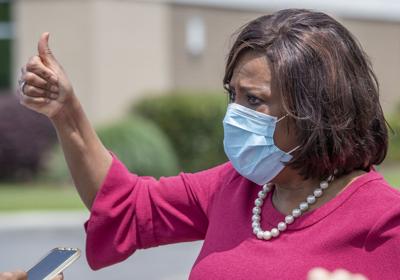The coronavirus pandemic adds another challenge to preparing for hurricane season this year, Baton Rouge officials say — but it's nothing they haven't dealt with before.
East Baton Rouge Parish Mayor-President Sharon Weston Broome says her administration has pinpointed extra facilities that could be used as public shelters this season. Her team has also been proactive about securing additional personal protection equipment, like masks and gloves, and has worked with local and regional emergency response and governmental agencies to modify plans to handle possible weather threats against the backdrop of a pandemic.
"We do have to think of preparedness against the backdrop of social distancing, wearing masks -- all the different attributes of dealing with the pandemic," Broome said. "The fundamental preparation still remains for hurricane preparedness."
Forecasters are predicting the 2020 hurricane season, which starts Monday, to be more active than normal, with between 13 and 19 named storms, six to 10 hurricanes, and three to six major hurricanes with wind strengths of Category 3 or higher.
Things could play out a little differently this year due to the coronavirus, according to Clay Reeves, director of the Mayor's Office of Homeland Security and Emergency Preparedness.
If social distancing measures remain in place throughout the next five months — and all signs point to that being the case — Reeves said the city-parish won't likely be able to lean on help from out-of-town volunteer groups as much or provide public shelters to as many people at any one given location this year.
"Normally if we house people for a short period of time we give them 10 square feet per person, and, if it's overnight, 20 square feet per person," Reeves said. "In a COVID-19 environment, the Department of Children and Family Services recommends 45 square feet per person."
At the parish's primary shelter, the F.G. Clark Activity Center on Southern University's campus, that would cause capacity to drop from 716 people to around 318 in this year, he said.
Following the floods of 2016, the two largest shelters in the parish were the Raising Cane’s River Center, which sheltered 844 people, and Celtic Studio Stage 5, which temporarily housed 726 survivors.
If those locations were used this year, coronavirus precautions would shrink their capacity by 55%, Reeves said.
Reeves said city officials have identified more sites as potential shelters for the 2020 hurricane season, conversations that included the parish's parks and recreation system and local churches with facilities that can serve as temporary housing for displaced people.
The reduced shelter capacity could present a challenge should the city-parish see an influx in evacuees from other areas — which often happens during hurricane season, Reeves noted.
But officials seem confident they could address those needs through a regional approach with other parishes.
"The good part about this is that it's not our first time to plan for something like this," Reeves said. "In 2009, we had H1N1 during hurricane season. We're really building off that 2009 plan. We plan for multiple events during the same time."
Broome adds the city-parish will likely depend more on its employees to serve as volunteers at facilities since it could become a health hazard accepting help from out-of-towners during the pandemic.
"One thing we've done is shore up our PPE [personal protective equipment] because if you're going to have people in shelters … then we have to have all our workers prepared too," she said. "If we have to put people in shelters, that means our team of volunteers will have to have PPE and the people in the shelter would have to wear masks, at minimum. And we would supply them in coordination with other entities."
The mayor urges residents this year to weave pandemic-related precautions into their readiness. That could include storing some extra masks in their disaster kits, along with hand soap and sanitizer.
And for those with underlying health conditions or apprehensive about going to public shelters, Broome is encouraging them to make plans with individuals in their immediate social circles regarding temporary housing.
"Who's in your intimate circle right now? Stay as close to those not only during COVID-19 but if another natural disaster happens," she said. "That helps minimize exposure."
Officials at some Baton Rouge hospitals also say they're also taking steps to prepare for hurricane season. That includes adding social distancing measures and monitoring PPE stock in light of the pandemic.
"We typically offer staff the opportunity to stay at the hospital during natural disasters, that's going to look different obviously," said Allison Hughes, Baton Rouge General's Emergency Management Coordinator. "We've got additional places where staff can shelter at the hospital and safely social distance."
Hughes said the hospital also serves as a partner with MOSHEP, the state and the city-parish's emergency services to aid each in the additional measures it will take this year to keep people healthy and safe should a hurricane or flooding occur.
"We are well connected this year," she said.









